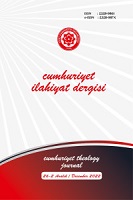Schleiermacher’in Psikolojik Yöntemi (Hermenötiği) ve Kur’ân’a Uygulanmasının İmkânı
Schleiermacher’s Psychological Method (Hermeneutics) and Its Possibility of Application to the Qur’ān
Author(s): Fatih ÖzaktanSubject(s): Hermeneutics, Sociology of Religion, Qur’anic studies, Psychology of Religion
Published by: Cumhuriyet Üniversitesi İlahyat Fakültesi
Keywords: Tafsīr; Qur’ān; Schleiermacher; Hermeneutics; Psychological Method;
Summary/Abstract: In terms of understanding and interpreting a text, both the Christian world and the Islamic world have developed a discipline appropriate to the nature of the belief in their own books. Schleiermacher, one of the names that had a profound effect on modern hermeneutics, proposes two methods for understanding and interpreting the New Testament (Gospels): grammatical and psychological methods. In this study, it was investigated whether the psychological method (hermeneutics) of Schleiermacher, who is a Christian theologian, can be utilized in the Qur’anic exegesis (tafsir) and interpretation (Ta’wil), and the similarities and intersections of this method with the sciences in the Qur’anic exegesis method have been attempted to be explained. In line with this goal, first of all, information about the understanding of the holy book in Christianity and Islam was given. Afterwards, the definitions of the intuitive and comparative method, psychological and technical task proposed by Schleiermacher in his psychological method were made and its contents were explained. In the last part, it has been evaluated whether the aforementioned methods would contribute to the interpretation of the Qur’an, and if a similar method has been formed as a science in the Islamic scientific tradition or in the method of tafsir, this was also stated. In addition, it has also been investigated whether the methods that cannot be used directly in the interpretation of the Qur’an can be applied to the authors of tafsir (mufassirun) and the tafsirs they have written, in other words, to the tafsir corpus. In Schleiermacher’s psychological method (hermeneutics), the main target is the text writer, not the text. The final achievement in this method, in which the author is centered, is that it is not possible to make a correct text analysis with a reading independent of the author. In this method, Schleiermacher proposes to know not only the text, but also the author and the sociocultural environment in which he lives. According to him, the geography and conditions of the author have a great influence on the formation of the text. Schleiermacher acknowledges that the authors of the Gospels; Matthew, Mark, Luke and John, were influenced by the sociocultural environment and added new meanings to the text and made additions. Therefore, he presented a method by considering how to understand a book that is partly inspired by God and partly a human product. Here, Schleiermacher built his psychological method (hermeneutics) on this understanding of revelation. According to him, the Bible texts should be read and interpreted in the context of the life and psychology of their authors. Knowing the non-linguistic context ensures a correct understanding of the Gospels. On the other hand, Muslims’ faith in the holy book is completely different from Christians. The Qur’an was protected from jinn and devils in bayt al-ʿizza and al-lawh al-Mahfooz and no creatures were allowed to interfere during the revelation process. The Prophet (pbuh) first memorized it himself, then had it memorized by the Companions, had the revelation scribes dictate it, and it has been preserved as it was revealed until today with collected and replicated. The Qur’an is a completely divine and heavenly book, different in nature from human speech, it is the word of God in wording and meaning, and the sole owner of the Qur’an is God. The biggest difference between the Qur’an and the Bible; The Qur’an is the word of God and the Bible is a religious text containing the interpretations of the clergy. Applying Schleiermacher’s psychological method in hermeneutics to the Qur’an means considering the Bible and the Qur’an, which are different from each other in terms of formation and source, as equal. Because of this difference between the two texts, using the methods and principles related to the text writer in Schleiermacher’s psychological method in the interpretation of the Qur’an causes a great inconsistency. Is it possible to apply some of the methods related to the text in Schleiermacher’s method in question to the text of the Qur’an? When the studies related to the Islamic scientific tradition and especially the discipline of tafsir are examined, it will be seen that a much more systematic version of Schleiermacher’s methods related to the text was applied to the text of the Qur’an centuries ago. Therefore, there is no need to resort to them. On the other hand, it seems possible to apply this method to mufassir and tafsirs. Because the mufassir is a human being, and his interpretation is a human-made work. According to Schleiermacher’s psychological method, it is not correct to read any tafsir as pure text. Tafsir should be evaluated together with the psycho-social situation of the mufassir. With this method, it is possible to reveal the social, political and theological thoughts that the mufassir have been influenced in their interpretations. This helps to identify right and wrong views, subjective and sociocultural effects in tafsir.
Journal: Cumhuriyet İlahiyat Dergisi
- Issue Year: 26/2022
- Issue No: 2
- Page Range: 823-840
- Page Count: 18
- Language: Turkish

